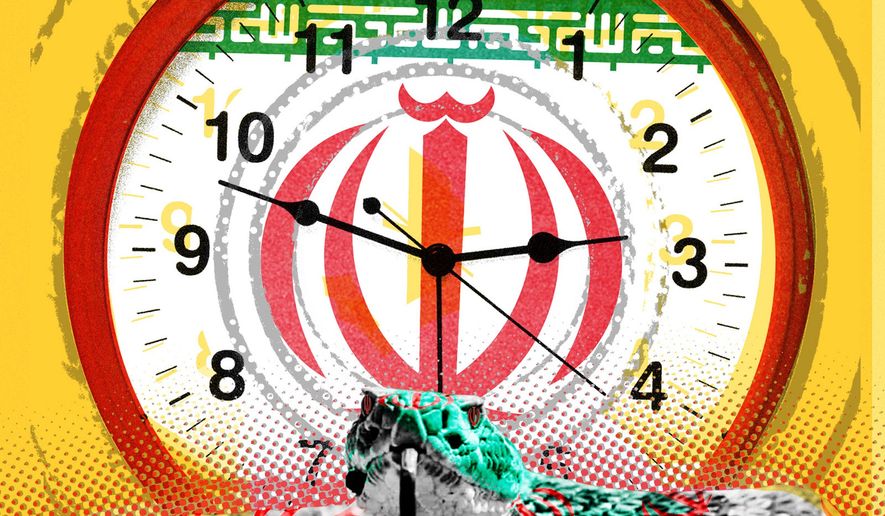
The news of three U.S. soldiers killed and 25 injured at a military base in Jordan by Iranian-backed Shiite militias in Syria needs to be a pivotal moment in the Middle East.
This attack on Americans is a trial by Iran to test whether the West in general and the U.S. in particular has the stomach to mount a response.
For too many years, Iran has engaged in a proxy war against the U.S., the West and moderate nations in the region with few to no repercussions.
This must stop.
There can be no more deniability or arms-distancing. This is a direct Iranian attack on the U.S. and needs to be treated as such, or the attacks will be more frequent and bolder, resulting in greater bloodshed.
This attack against the soldiers in Jordan, of all places, is not a testament to Iran’s strength. It is the direct result of the U.S. and the U.K.’s weakness against Iranian-sponsored terrorism.
In the last few months, the Iranian-backed Houthis have been responsible for launching drone and missile attacks on ships in the strategically important shipping lanes of the Red Sea. Their stated targets are ships associated with or bound for Israel, and they claim that these actions are in retaliation to Israel’s military operations in the Gaza Strip.
Nothing could be further from the truth, and using Israel’s justified war against Hamas is a mere excuse for Iran to flex its muscle and control a significant percentage of international trading routes.
The hallmark of the Houthi attacks lies in their use of ballistic missiles, which cost an estimated $100,000 to $300,000 each.
It is clear that the decision to launch ballistic missile attacks on civilian ships originated from the Islamic Revolutionary Guard Corps in Tehran. This conclusion is supported by the fact that, according to heavy weapons experts, all the missiles were produced by the military industries of the Revolutionary Guard.
Iran’s motive is clear. Jeopardizing the security of free shipping in international waters affects global trade and the global economy, energy transportation, food and resource distribution, humanitarian aid, political stability, environmental protection, regional and international relations, maritime law and governance.
The security of free shipping in international waters is vital for the functioning of the global economy, the well-being of nations, and the prevention of conflicts, emphasizing the interconnectedness of nations in the maritime domain.
In this regard, Iran’s actions undermining shipping security should be analyzed in a broader context. It appears that Tehran’s efforts to disrupt maritime communication lines are part of a larger strategy aimed at undermining the West.
These attacks should be seen through the prism of Iran’s track record of implementing destructive programs over the years.
Examples include manipulating drug consumption rates in Western societies through global management and large gangs, using immigration as a tool for erosion in democratic countries, and orchestrating human trafficking at the international level to influence the economies and demographic structures of free societies. The ultimate goal seems to be the radicalization of Muslim minorities residing in Western societies.
Although Iran may not openly declare a hybrid war, it is actively engaged in a campaign to systematically dismantle the infrastructure of democratic societies by exploiting the vulnerabilities inherent therein.
Within this framework, the Houthi attacks on commercial ships in international waters represent another facet of this hybrid war of attrition. These attacks contribute to increased costs in insurance and transportation, unnecessary expenses, and an uncontrolled rise in the level of civilization in free societies. This, in turn, fosters dissatisfaction and political instability.
This is especially important as the Middle East progresses toward a split between the moderate and pragmatic, largely Sunni nations, who seek peace with Israel and a better future for their people, and the Iranian crescent of terror, stretching from Lebanon through Syria, Iraq and Yemen.
This new axis of evil seeks regional superiority for its imperialistic aims beyond.
The Houthis, and terrorist groups such as Hamas, Hezbollah, Islamic Jihad, ISIS and Hashd al-Shaabi (aka the Popular Mobilization Forces), are comparable to the arms and legs of an octopus. Attempts to cut off one leg results in a rapid reconstruction by the overarching entity. Hence, it becomes imperative to target and dismantle the central leadership, or “head,” of the octopus to disrupt and neutralize these proxy organizations.
When my fellow opposition activists and I launched our campaign in Britain about a year ago for designating the Islamic Revolutionary Guard Corps as a terrorist organization, we were well aware of Iran’s strategy and tried to highlight it.
I have delivered this message around the world, in Ukraine and even in Israel, where I spoke recently in its parliament at the Knesset Israel Victory Caucus led by the Middle East Forum Israel.
The goal of the Shiite militias in Syria and Iraq and the Houthis is to implement a part of Iran’s strategic plan to destroy Western civilization at any cost.
Nevertheless, this is not a precipitous time for the mullahs in Iran.
The ayatollah regime is on its knees, and the Iranian people thirst for freedom, but the success of Tehran’s proxy war in the region and against Western interests, without too much reaction, is a boost to its longevity.
Let’s not forget that it is a regime hurtling at breakneck speed toward nuclear weapon capability, and the means to deliver their potential nuclear weapons are far in excess of any regional targets.
Iran is overconfident, and some American bloodshed with a limited response will only embolden its global aspirations.
It is time to stop merely responding and playing Iran’s proxy war. It is time to face Iran head-on.
– Vahid Beheshti is a leader of the Iranian opposition in exile, based in London. Published courtesy of The Washington Times


